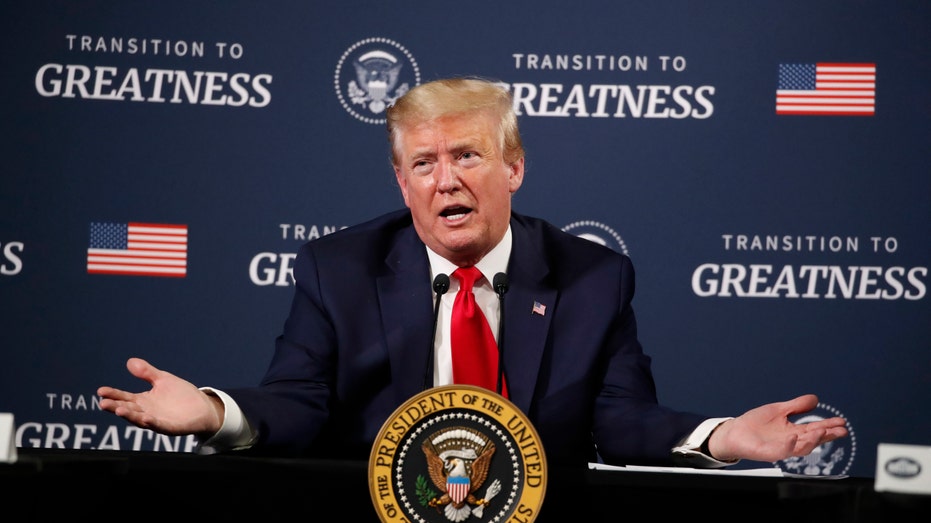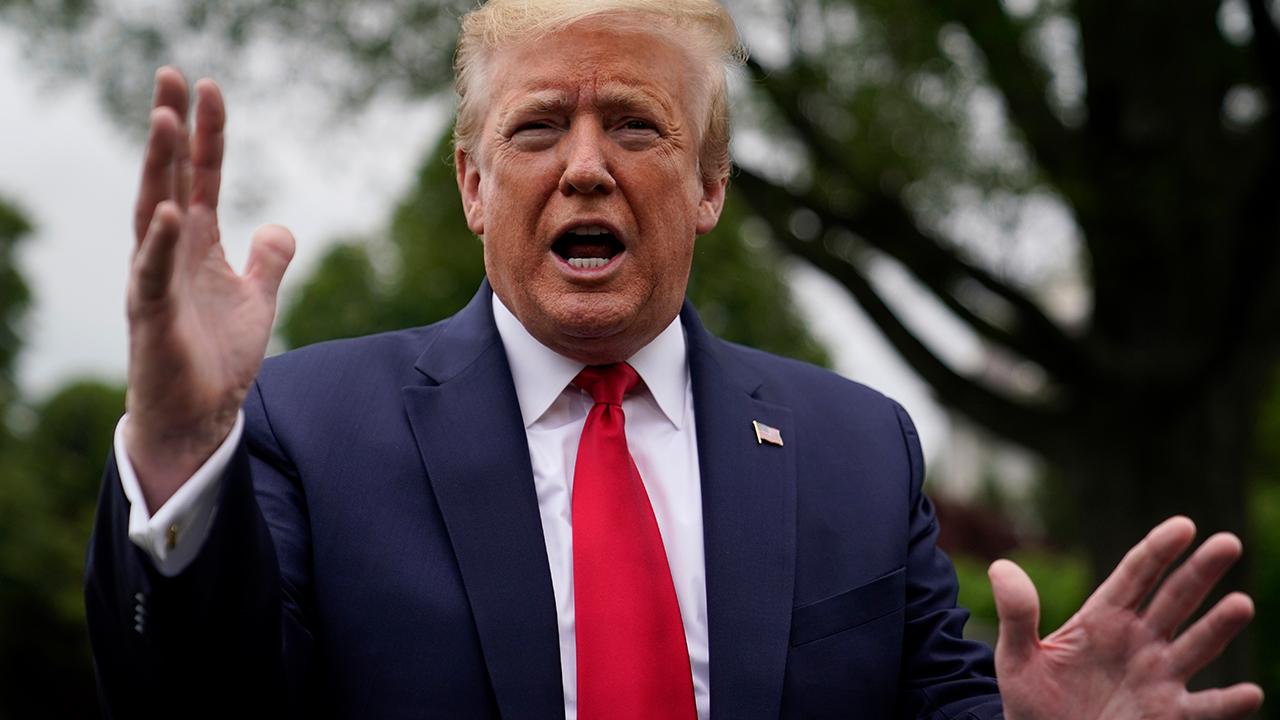US plans new armed talks aimed at limiting Russian, Chinese and US nuclear warheads
Trump seeks Russia’s help in bringing China into three-way deal
Get all the latest news on coronavirus and more delivered daily to your inbox. Sign up here.
President Trump's new arms-control negotiator is planning to meet with his Russian counterpart soon to discuss a new U.S. proposal for a far-reaching accord to limit all Russian, Chinese and U.S. nuclear warheads, U.S. officials disclosed Thursday.
The talks will mark the first time the Trump administration has opened negotiations on an agreement to replace the New START accord, which covers Russian and U.S. long-range nuclear arms and is due to expire in February.
The disclosure of the new talks came as the Trump administration moved to withdraw from an old agreement: the separate Open Skies treaty, a nearly three-decade-old accord intended to reduce the risk of war between Russia and the West.
Marshall Billingslea, who took up his post last month as Mr. Trump's senior envoy on arms control, will launch the new talks with Sergei Ryabkov, the deputy Russian foreign minister. They have been working to finalize the agenda for the meeting, which is likely to take place in Vienna.
SENATE PASSES BILL REMOVING ROGUE CHINESE FIRMS FROM US STOCK EXCHANGES
"We have agreed that as soon as possible, taking into account the Covid virus, we will get together to begin negotiations," a senior Trump administration official said.
The new U.S. proposal is far more ambitious than the 2010 New START accord, not least because it seeks to convince China to join the negotiations. U.S. officials said the wide-ranging deal is necessary because of the projected growth in the Chinese and Russian nuclear arsenals.
Critics warn the Trump administration strategy amounts to an overreach -- and could lead to a deadlock that will undermine the existing arms-control framework, which has already begun to fray.
Concern over the prospects for arms control was expressed by European officials after Secretary of State Mike Pompeo said the U.S. will give six months' notice to treaty participants that it is leaving the 1992 Open Skies accord, which allows the West and Russia to carry out reconnaissance flights over each other's territories to build confidence that an attack isn't being planned.
US, CHINA MOVE FORWARD IN IMPLEMENTING TRADE DEAL
The U.S. has accused Russia of denying Western planes full access in flights over its territory. Defending his decision, Mr. Trump said he would seek to maintain good relations with Russia by pursuing other arms control agreements or perhaps rejoin the Open Skies accord if Moscow addressed U.S. concerns.
"There's a very good chance that we'll make a new agreement or do something to put that agreement back together," Mr. Trump said. "We're going to pull out and they are going to come back and want to make a deal."
Deputy Foreign Minister Aleksandr Grushko of Russia said the U.S. had relied on "contrived pretexts" in taking its decision and that it was, part of a pattern of "destructive steps in the sphere of strategic stability and security," state news agency RIA Novosti reported.
CHINA STOCK GSX TECHEDU IS A 'MASSIVE LOSS-MAKING BUSINESS'
China, which has with a much smaller nuclear arsenal than the U.S. and Russia, has repeatedly said it won't be party to a three-way nuclear accord. Beijing has no history of allowing intrusive arms-control verification on its territory.
A Chinese Foreign Ministry spokesman said in January that Beijing had "no intention to participate" in three-way arms talks. He charged that Washington was demanding that China join such negotiations as "a pretext to shirk and shift its own nuclear disarmament responsibilities." A spokesman for the Chinese embassy didn't respond to a request for comment.

President Donald Trump speaks during a listening session with African-American leaders at Ford's Rawsonville Components Plant that has been converted to making personal protection and medical equipment, Thursday, May 21, 2020, in Ypsilanti, Mich. (AP
Mr. Billingslea, however, has told the Russians that they need to help bring China to the negotiating table. The U.S. plans to use diplomatic -- and possibly economic leverage, some officials hint -- to insist that Beijing participate, U.S. officials said.
"I am not going to pretend that this is going to be easy. It is something new: The trilateralization of nuclear arms control," the senior Trump administration official said. "The Chinese do not have the same history with arms-control verification, so this will be a learning experience for them, but it is an experience we expect them to gain."
TRUMP EYES CRACKDOWN OF NYSE-LISTED CHINESE COMPANIES
The new U.S. proposal, in another break from New START, would also cover all nuclear warheads, including those kept in storage or which are mounted on short-range systems.
Such a provision would enable the U.S. to constrain Russia's arsenal of tactical nuclear weapons, which American officials assert is growing, as well as Chinese warheads, which some experts believed are kept in storage and not mounted on missiles on a day-to-day basis. Specifically, the U.S. wants Russia to eliminate its nuclear warheads for ground-based short-range missiles -- something Soviet leader Mikhail Gorbachev pledged to do in 1991.
Verifying limits on warhead stockpiles, experts say, is much more difficult than counting large missiles, bombers and submarines that carry nuclear weapons and would require much more stringent monitoring measures.
The Trump administration says that it plans to propose more intrusive verification measures than under New START. This includes a demand for greater sharing of missile-test telemetry and measures that allow faster on-site inspections.
The British and French nuclear forces wouldn't be part of the accord under the U.S. plan, though Russian officials have sometimes argued that they should.
Negotiating a major arms-control treaty is a yearslong process, raising the question of what constraints will be kept in place once the negotiations are under way.
GET FOX BUSINESS ON THE GO BY CLICKING HERE
The New START treaty can be extended for as many as five years by mutual consent. But Trump officials have hinted the U.S. may not do so unless the new three-way negotiations have begun and are making headway.
The collapse of the New START constraints, and the verification provisions it includes, would mark a further unraveling of the arms-control regime. Last year, the U.S. withdrew from the Intermediate-range Nuclear Forces Treaty, which it alleged Moscow was violating.
Of all the looming obstacles toward a new accord, the principal one is persuading China to join.
China has about 320 warheads, according to the Federation of American Scientists. That is a fraction of the 1,750 nuclear weapons the U.S. has deployed on its long-range and shorter-range systems, among the 3,800 warheads in the U.S. stockpile, according to the group's estimate.
The U.S. Defense Intelligence Agency has said, however, that the Chinese arsenal is expected to at least double over the next decade.
CLICK HERE TO READ MORE ON FOX BUSINESS
Frank Klotz -- a retired three-star general and the former head of the National Nuclear Security Administration, which oversees the development of the U.S. nuclear arsenal -- said that the idea of drawing China into a new three-way accord was fraught with difficulties.
Establishing equal limits on Chinese, U.S. and Russian forces wouldn't be an option in seeking a new agreement because Washington doesn't want to allow China to match the current American level. Nor does the Pentagon want to cut its force to China's level.
"Why would the Chinese agree to be locked into a three-way agreement at significantly lower numbers than the U.S.?" Mr. Klotz said. "Why would Russia or the U.S. agree to allow China to have numbers equal to Russia and the U.S."
--Gordon Lubold and James Marson contributed to this article.
Write to Michael R. Gordon at michael.gordon@wsj.com




















